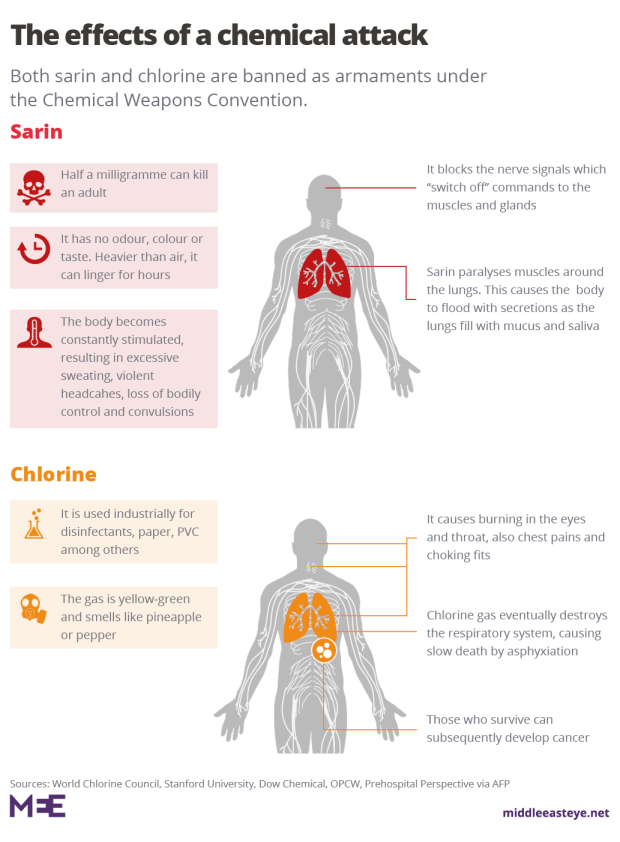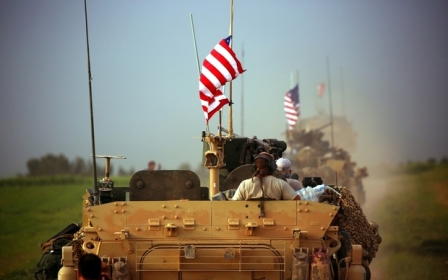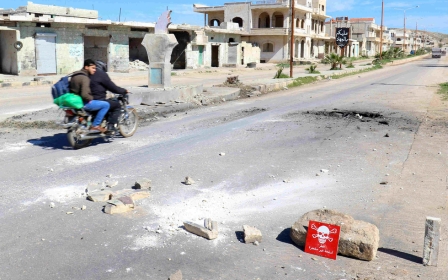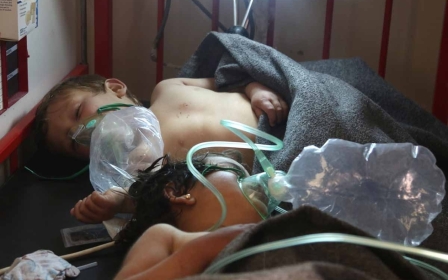Trump slams 'Animal Assad' for Ghouta chemical weapons attack
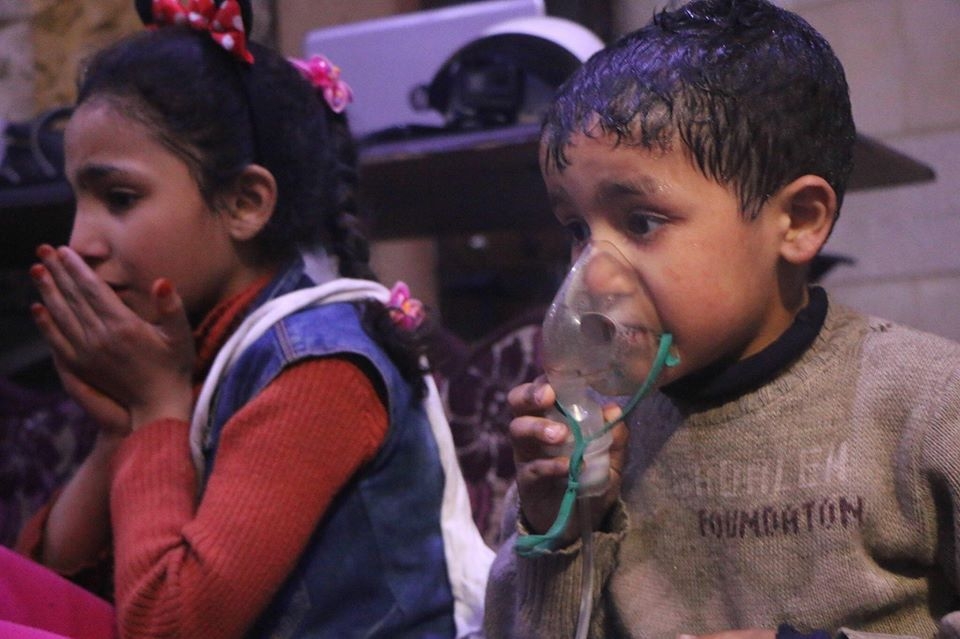
US President Donald Trump delivered a scathing attack on Syrian President Bashar al-Assad after dozens of people were killed in a chemical weapons strike in the rebel-held town of Douma in Eastern Ghouta.
"Many dead, including women and children, in mindless CHEMICAL attack in Syria," he tweeted.
"Area of atrocity is in lockdown and encircled by Syrian Army, making it completely inaccessible to outside world. President Putin, Russia and Iran are responsible for backing Animal Assad. Big price..."
Still, Republican Senator John McCain said later on Sunday that Trump's comments that the US military would leave Syria "very soon" had emboldened Assad, CNN reported.
At least 70 people were killed after a chlorine bomb hit Douma hospital and a second attack with "mixed agents" including nerve agents hit a nearby building, according to the Syrian American Medical Society (SAMS)
"Seventy people suffocated to death and hundreds are still suffocating," Raed al-Saleh, head of the White Helmets rescue organisation, was quoted by the BBC as saying. The pro-opposition Ghouta Media Center also put the death toll at over 70.
Washington said the reports - if confirmed - would demand an immediate international response.
The Syrian government denied its forces had launched any chemical attack as reports began circulating on Saturday night. The government said rebels in Douma were collapsing and spreading false news.
The lifeless bodies of around a dozen children, women and men, some of them with foam at the mouth, were shown in one video circulated by activists.
"Douma city, April 7... there is a strong smell here," a voice can be heard saying.
The US State Department said reports of mass casualties from an alleged chemical weapons attack in Douma were "horrifying" and would, if confirmed, "demand an immediate response by the international community".
France will "do its duty" over an alleged gas attack against civilians in Syria's Eastern Ghouta region, Foreign Minister Jean-Yves Le Drian said on Sunday.
France has repeatedly warned that evidence of further use of chemical weapons in Syria was a "red line" that would prompt French strikes.
"The use of chemical weapons is a war crime," Le Drian said in a statement, adding that France had asked the UN Security Council to convene as soon as possible to examine the situation in Eastern Ghouta.
Britain's Foreign Office also called the reports, if confirmed, "very concerning" and said "an urgent investigation is needed and the international community must respond. We call on the Assad regime and its backers, Russia and Iran, to stop the violence against innocent civilians."
Russia, however, dismissed the reports. "We decidedly refute this information," Major-General Yuri Yevtushenko, head of the Russian peace and reconciliation centre in Syria, was cited as saying by Interfax news service.
Assad's forces have made progress in recovering Eastern Ghouta, on the outskirts of Damascus, in a Russian-backed military campaign that began in February, leaving just Douma in rebel hands.
Fighting had lulled in recent days as Russia, a key ally of the Assad government in its seven-year-long civil war, engaged in negotiations with Jaish al-Islam, the rebel group in control of Douma.
Talks stalled, however, and the government resumed its bombardment on Friday and Saturday, in an apparent attempt to pressure Jaish al-Islam to agree to the government's withdrawal terms.
The Syrian government has divided Eastern Ghouta into isolated pockets and negotiated the withdrawal of rebels and family members to opposition areas in northern Syria.
If confirmed, the reported chemical attack appears to have forced Jaish al-Islam back to the negotiating table. Russia's military said an operation would begin on Sunday to evacuate Jaish al-Islam fighters, Interfax reported. The group had requested negotiations with the government, Syrian state television reported earlier on Sunday.
There was no immediate response from the rebel group.
The offensive in Ghouta has been one of the deadliest of the war, killing more than 1,600 civilians, according to the Syrian Observatory for Human Rights.
The Britain-based Observatory said it could not confirm whether chemical weapons had been used in the attack on Saturday.
Observatory director Rami Abdul Rahman said 11 people had died in Douma as a result of suffocation caused by the smoke from conventional weapons being dropped by the government. It said a total of 70 people suffered breathing difficulties.
'Immediate response'
Basel Termanini, the US-based vice president of SAMS, told Reuters another 35 people had been killed at the nearby apartment building, most of them women and children.
SAMS operates 139 medical facilities in Syria where it supports 1,880 medical personnel, according to its website.
"We are contacting the UN and the US government and the European governments," he said by telephone.
The joint statement from SAMS and the civil defence said medical centres had received more than 500 cases of people suffering breathing difficulties, frothing from the mouth and smelling of chlorine.
One of the victims was dead on arrival, and six died later, it said. Civil defence volunteers reported more than 42 cases of people dead at their homes showing the same symptoms, it said.Syrian state news agency SANA said Jaish al-Islam was making "chemical attack fabrications in an exposed and failed attempt to obstruct advances by the Syrian Arab army," citing an official source.
US State Department spokeswoman Heather Nauret recalled a 2017 sarin gas attack in northwestern Syria that the West and the United Nations blamed on Assad's government.
"These reports, if confirmed, are horrifying and demand an immediate response by the international community," Nauert said in a statement.
"The Assad regime and its backers must be held accountable and any further attacks prevented immediately," she said.
"The United States calls on Russia to end this unmitigated support immediately and work with the international community to prevent further, barbaric chemical weapons attacks."
The Syrian government has repeatedly denied using chemical weapons during the conflict.
New MEE newsletter: Jerusalem Dispatch
Sign up to get the latest insights and analysis on Israel-Palestine, alongside Turkey Unpacked and other MEE newsletters
Middle East Eye delivers independent and unrivalled coverage and analysis of the Middle East, North Africa and beyond. To learn more about republishing this content and the associated fees, please fill out this form. More about MEE can be found here.


